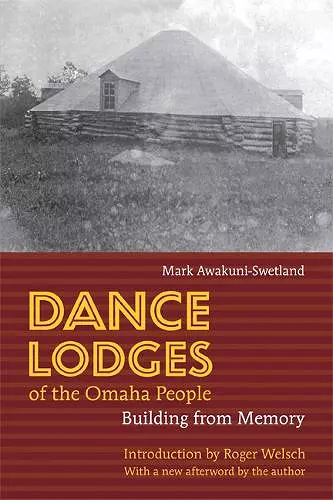Dance Lodges of the Omaha People
Building from Memory
Mark Awakuni-Swetland author Roger Welsch editor
Format:Paperback
Publisher:University of Nebraska Press
Published:1st Jun '08
Currently unavailable, and unfortunately no date known when it will be back

Provides insights into how dance lodges shaped Omaha cultural identity
Drawing on the oral histories of forty Omaha elders collected in 1992, Dance Lodges of the Omaha People provides insights into how these lodges shaped Omaha cultural identity and illustrates the adaptive abilities of the modern Omaha tribe. A new afterword by the author highlights advances in research on these unique structures since 1992.After the Omaha Nation was officially granted its reservation land in northeastern Nebraska in 1854, Omaha culture appeared to succumb to a Euro-American standard of living under the combined onslaught of federal Indian policies, governmental officials, and missionary zealots. At the same time, however, new circular wooden structures appeared on some Omaha homesteads. Blending into the architectural environment of the mainstream culture, these lodges provided the ritual space in which dances and ceremonies could be conducted at a time when such practices were coercively suppressed. Drawing on the oral histories of forty Omaha elders collected in 1992, Dance Lodges of the Omaha People provides insights into how these lodges shaped Omaha cultural identity and illustrates the adaptive abilities of the modern Omaha tribe. The lodges replaced the diminished pre-reservation tribal institutions as maintainers of tribal cohesion and unity and at the same time provided an arena for selective acculturation of outside ideas and behaviors. A new afterword by the author highlights advances in research on these unique structures since 1992 and speculates on the connection between these lodges and the spread of the Omaha Hethushka dance across the Great Plains.
“This volume is a success as both history and ethnography and presents a useful case study of Native cultural resistance and adaptation to pervasive efforts at detribalization and assimilation. It also emphasizes the research value of tribal oral history and illustrates how such histories might be collected and preserved for future generations.”—John M. O’Shea, Journal of Anthropological Research
ISBN: 9780803217577
Dimensions: unknown
Weight: 318g
214 pages